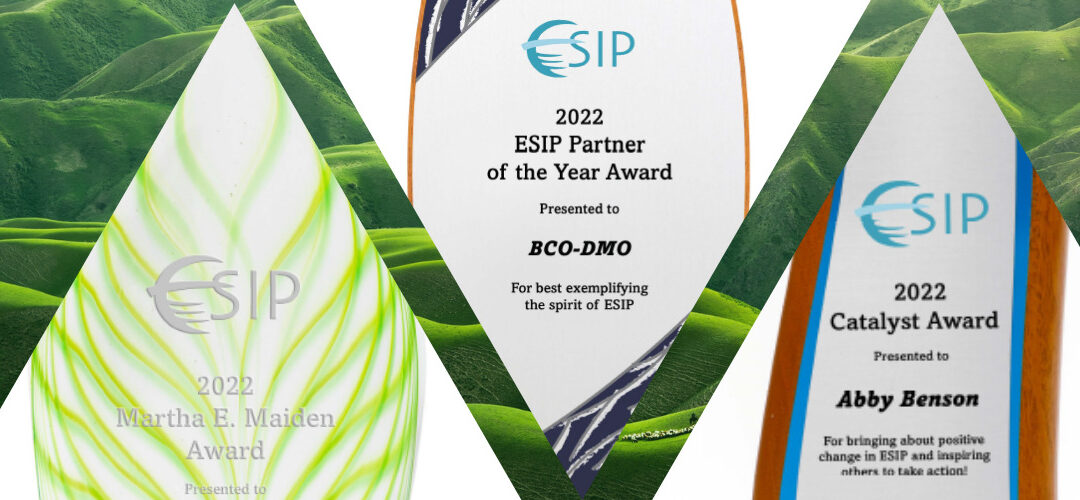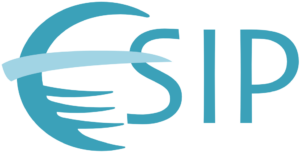Innovation to Impact. See you at the July ESIP Meeting.
ESIP Honors Award Winners for 2022

“Organizations are driven by people, and ESIP people are Earth science data professionals,” said Susan Shingledecker, Executive Director of ESIP. “While our technical expertise varies widely and our domain knowledge spans many disciplines, ESIP participants are passionate about the power of Earth science data to change the world for the better. Our award winners really show this.”
Learn more about ESIP clusters and telecons: esipfed.org/collaborate
Martha E. Maiden Award Honors Lifetime Achievement
Named for Martha E. Maiden, Program Executive for Earth Science Data Systems at NASA, the award honors individuals who have demonstrated leadership, dedication, and a collaborative spirit in advancing the field of Earth science information.
Maiden attended the virtual awards ceremony during the January 2022 ESIP Meeting when this year’s award was presented to Chris Lynnes, recently retired as a system architect at NASA’s Goddard Distributed Active Archive Center (DAAC). In the words of his nominators, the “sheer breadth of his experience and dedication to his craft” is matched only by Lynnes’ “enthusiasm for innovation, his creativity and his seemingly boundless energy for organizing and leading cross-functional teams.”
Lynnes’ work spans a 30-year career with science data systems at NASA. In his most recent position, he was responsible for the Earth Observing System Data and Information System (EOSDIS) structure, including 54 petabytes of archive data, distribution in 2021 of two billion science data files across the world and support to almost five million scientists, academics, and the general public. Lynnes has represented NASA in many external collaborations and was also a key member of ESIP’s early days and helped Maiden to coalesce the group into an organization.
What I do: I have led the ESIP Discovery Cluster, helping to make data easier to find and use.
Why I do it: I just retired, and I’ve seen the impact good data management has on real-world challenges. Big data is only as good as the architecture supporting it.
President’s Award Honors Service
Selected by the ESIP President, this award recognizes a participant who has made significant, tangible contributions to ESIP during the previous year.
“One of the most enjoyable roles of the ESIP President is to select the awardees for two of our most prestigious awards, the Catalyst Award and the President’s Award,” said ESIP President Ken Casey, Deputy Chief of the Data Stewardship Division in NOAA's National Centers for Environmental Information.
Casey announced the President’s Award winner, Robert (Bob) Downs from Columbia University, remarking, “ If you have been involved in ESIP for more than five or six minutes, the odds are very good you have interacted with Bob. And if you have interacted with Bob, you will nod your head in vigorous agreement when I say that he brings a positive attitude and a willing spirit to everything he does.”
What I do: Contribute to ESIP Collaboration Areas and help ensure that data is curated, open, preserved and reusable.
Why I do it: Through serving on the leadership team of the Information Quality Cluster, I’ve learned about the importance of cross-collaboration within ESIP and working across disciplines to improve the use of Earth science data.
Action is Inspired Catalyst Awardees
Given to participants who have brought about positive change in ESIP and inspired other members to take action and recognizes exceptional volunteer efforts. The Catalyst Award winner, Abby Benson from the USGS, leads the Biological Data Standards Cluster.
“Abby got this cluster off the ground quickly and, through her enthusiasm, vision and dedication, maintained one of the highest attendance rates of all the clusters,” Casey said, who selects the Catalyst Award as ESIP’s President. “Abby helped the group develop a critical output, a primer for new biological observation data managers, and so importantly, Abby achieved this goal in a way that was extremely inclusive, embodying the ESIP ideal.”
What I do: I lead the Biological Data Standards Cluster. In our first year, we created and shared a primer for data managers handling large bio datasets.
Why I do it: Biodiversity matters. Understanding trends is complex, so my team wants to make the data more accessible and reusable.
ESIP Recognizes a Partner of the Year
This award, selected by the Partnership Committee, honors an ESIP partner organization that best exemplifies the spirit of ESIP. This is often displayed through collaboration, supporting data exchange, contributions to the ESIP community, or leadership in Earth science data.
The ESIP Partner of the Year award goes to the Biological and Chemical Oceanography Data Management Office (BCO-DMO). The office’s mission is to work with principal investigators to serve data and related information online from research projects funded by the National Science Foundation (NSF)’s Biological and Chemical Oceanography Sections and the Office of Polar Programs. In ESIP, BCO-DMO contributes people, expertise and enthusiasm as big as the oceans they seek to protect.
BCO-DMO has been an active partner since 2013, helping build the ESIP community’s exploration and development of novel ideas, practices and infrastructure that support data stewardship and use within the geosciences. BCO-DMO staff regularly co-chair ESIP meeting sessions and participate in ESIP clusters throughout the year, including the Biological Data Standards, Marine Data and Schema.org . They have contributed to notable projects including a data manager primer for biological data, draft recommendations for publishing non-tabular, complex ecological datasets and three versioned releases of Science on Schema.
Notably, BCO-DMO also actively contributed to the ESIP and Research Data Alliance (RDA) collaboration Earth, Space, and Environmental Science Interest Group (ESES IG) by engaging journal publishers and repositories to address data publication workflow challenges and to include underrepresented groups in data stewardship from the global south.




